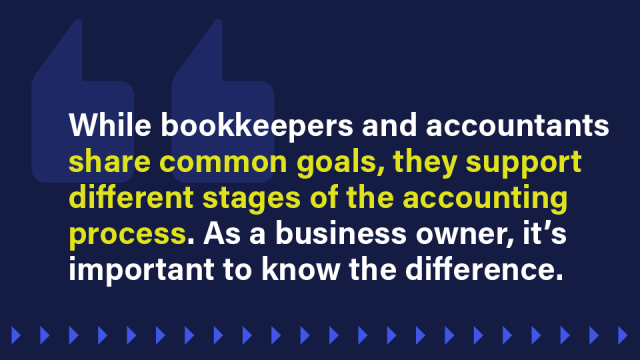Most business owners struggle to describe the difference between an accountant and a bookkeeper. While these financial roles share common goals, they support different stages of the accounting process. Understanding these differences is crucial for making the right choice for your business.
In this comprehensive guide, we’ll explore:
- The key differences between bookkeepers and accountants.
- When to hire each type of professional.
- How the cloud fits into modern financial management.
Understanding the basics: Bookkeeping vs. accounting

What is accounting?
Accounting is the process of keeping financials for a company by recording, summarizing, analyzing, advising, and reporting. Certified Public Accountants (CPAs) usually perform accounting and assurance tasks. Their work focuses on the big picture of your company’s financial health, ensuring long-term success through strategic planning and analysis.
What is bookkeeping?
Bookkeeping is the record-keeping part of the process where all financial records of a business, including day-to-day transactions, are recorded and stored in a database. Bookkeepers focus on accurate daily record-keeping and typically handle tasks like:
- Recording and classifying daily financial transactions.
- Managing accounts payable and receivable.
- Processing payroll.
- Maintaining and balancing the general ledger.
- Creating basic financial statements.
Where bookkeeping ends and accounting begins
Bookkeepers’ and accountants’ work often overlap, but there are a few key differences:
Bookkeeper responsibilities
- Record and classify daily financial transactions.
- Manage company payroll.
- Handle accounts payable and receivable.
- Maintain accurate financial records.
- Generate basic financial reports.
Accountant responsibilities
- Review data and financial statements.
- Analyze and interpret financial data.
- Provide strategic financial advice.
- Handle tax planning and preparation.
- Create detailed financial forecasts.
- Conduct audits and ensure compliance.
Making the right choice: Bookkeeper or accountant?
Choosing between a bookkeeper and an accountant depends primarily on your business’s size, complexity and specific needs. Consider these factors:
When to hire a bookkeeper
Starting with a bookkeeper makes sense when you’re looking for help with the fundamental aspects of financial management. If you find yourself spending too much time managing daily QuickBooks entries and basic financial tasks, a bookkeeper can provide immediate relief. They’re particularly valuable when your business has straightforward transactions that need consistent, accurate recording. Bookkeepers excel at maintaining your day-to-day financial records while keeping costs manageable, making them an excellent choice for businesses with smaller budgets but a clear need for professional financial support.
A bookkeeper might be your ideal first hire if you’re looking to establish a strong financial foundation without the higher investment an accountant requires. They can help set up and maintain your QuickBooks system, ensure your transactions are properly recorded, and keep your financial records organized and up-to-date. This level of organization and accuracy will prove invaluable if you later decide to bring in an accountant for more advanced financial guidance.
Hire a bookkeeper if…
- You need help with daily financial management.
- Your business has simple, straightforward transactions.
- You want to maintain accurate financial records cost-effectively.
- You have a smaller budget for financial services.
When to hire an accountant
As your business grows and becomes more complex, an accountant’s expertise becomes increasingly valuable. Consider bringing in an accountant when you need more than just accurate record-keeping – when you need someone who can provide strategic financial planning and help guide your business’s financial future. An accountant becomes particularly important when you’re dealing with complex financial structures or when you need sophisticated tax planning and advisory services that go beyond QuickBooks basics.
Accountants prove especially valuable when you’re ready to take a deeper look at your business’s financial health and future. If you find yourself needing detailed financial analysis, wanting to understand the implications of major business decisions, or requiring expert tax planning advice, an accountant’s expertise becomes essential. They can help you understand not just where your money is going, but how to use it more strategically to achieve your business goals.
Hire an accountant if…
- You need strategic financial planning beyond the basics.
- Your business has complex financial needs.
- You require tax planning and advisory services.
- You want in-depth financial analysis and forecasting.
Decision time: 5 key points to consider
Remember these key points when choosing between a bookkeeper and an accountant:
- Assess your business’s current needs.
- Consider any software or app expertise requirements.
- Evaluate the complexity of your financial operations.
- Think about your long-term business goals.
- Understand the value each professional brings.
What does “the cloud” have to do with your choice?
Modern financial management requires both bookkeepers and accountants to work from the cloud. This shift to cloud-based accounting has revolutionized how financial professionals work together, and it’s imperative that your new employee understands how to use this common, necessary technology. Here’s why:
1. Enhanced security
Cloud-based financial management offers unprecedented security features that protect your sensitive financial data. Advanced firewall protection serves as your first line of defense, blocking unauthorized users from accessing the servers where your financial information resides. Even in the unlikely event of a security breach, your data remains protected through high-level encryption, ensuring that any intercepted information stays unreadable and secure. This multi-layered security approach provides peace of mind that your financial data is protected by the most advanced security measures available.
2. Improved collaboration
The cloud has transformed how bookkeepers and accountants work together. With real-time access to financial data, both professionals can view and update information simultaneously, eliminating the delays and confusion that often came with traditional file sharing. Team communication flows more smoothly when everyone works from the same set of numbers, and workflow management becomes more efficient when updates and changes are instantly visible to all authorized users. This enhanced collaboration leads to fewer errors, faster problem resolution, and better financial outcomes for your business.
3. Disaster recovery
Perhaps one of the most valuable aspects of cloud-based financial management is its robust disaster recovery capabilities. Gone are the days of worrying about lost files or crashed hard drives. Modern cloud solutions automatically back up your financial data regularly, ensuring that no transaction or record is ever truly lost. If a system failure occurs, quick recovery options get you back to business fast. This automatic protection against data loss means your financial records remain safe and accessible, regardless of what happens to your local hardware.
Final thoughts: You may end up needing both
Many businesses ultimately find they need both professionals—a bookkeeper to maintain accurate daily records and an accountant to provide higher-level financial strategy and guidance. This combination ensures you have both the detailed financial tracking and the strategic oversight necessary for business success.
Need help finding the right candidate? Rightworks can help. Check out our recent blog posts on staffing today.

